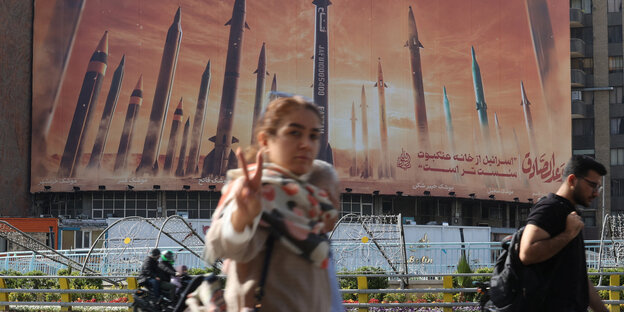In parallel with the attack on Israel, the regime has increased internal repression. Apparently “Zionism” is behind women's disobedience.

A poster encourages the Iranian missile program – Monday in Tehran Photo: Majid Asgaripour/Reuters
SEDAN taz | “The probability of being killed by the morality police is currently much greater than the probability of being killed by Israeli missiles.” wrote Pardis Rabiee, a women's activist from Iran, on her X account on Sunday. The night before, the Iranian Revolutionary Guard had attacked Israel with drones and missiles; Since then a counterattack was expected.
Rabiee's fear is no coincidence: At the same time as the major attack on Israel, the Iranian regime has also increased domestic repression against women's rights activists, queer people, and other critics. On Saturday afternoon, a few hours before the launch of the first drone, the first information about an intensified deployment of the moral police spread on social networks. The police had announced it the day before under the name “Project Light.” After the overnight attack on Israel, the Revolutionary Guards announced in a statement on Sunday that they would arrest people who show solidarity with Israel.
It is unknown how many people have been arrested since the weekend. According to unconfirmed eyewitness reports, hundreds of people have been affected, including Dina Ghalibaf, a student who claimed to have been sexually abused by the moral police, and Aida Shakerami, the sister of Nika Shakerami, who was murdered in connection with the protests.
A non-binary person from Tehran reported to taz: “The morality police surround women and homosexuals with groups of six to eight guards with the aim of sowing fear.” A woman from Tehran who was arrested in 2019 said: “We will not give up. “The regime has no base among the population.” The Revolutionary Guards wanted the attack on Israel, not the population. A lesbian woman from Rasht told the taz that she hopes the world does not minimize the attack on Israel or the “attack on us.” The hashtag “War on Women” has been circulating on social media since Monday.
Accusations against the protest movement
The State has been propagating for years and, since the “Woman Life Freedom” movement that began a year and a half ago, an alleged connection between “Zionism” and the disobedience of Iranian women who remove their veils. In April last year, well-known cleric Masoud Ali said: “Zionists are the ones who act against the hijab and the family system in Iran.”
The head of the cultural commission of Tehran city hall also accused the protest movement of siding with the “Zionists.” His accusation was that the movement did not comment on the situation in the Gaza Strip. The question of Israel and Palestine in Iran is so instrumentalized by the regime that people can hardly comment on it without it being interpreted for or against the State and, in case of doubt, against it.
At the height of the protest movement in December 2022, an audio recording was leaked in which members of the Revolutionary Guard, in a secret meeting, described the protesters as a movement controlled by, among other things, “Zionists.”
A look at history also shows how internal repression and foreign policy tensions are intertwined: the mandatory wearing of the veil was enshrined in law in Iran during the Iran-Iraq war in 1983. The then head of state Ruhollah Khomeini already did so. had asked during the 1979 revolution. But for several years the women successfully resisted until this was no longer possible due to the militarized war situation.
